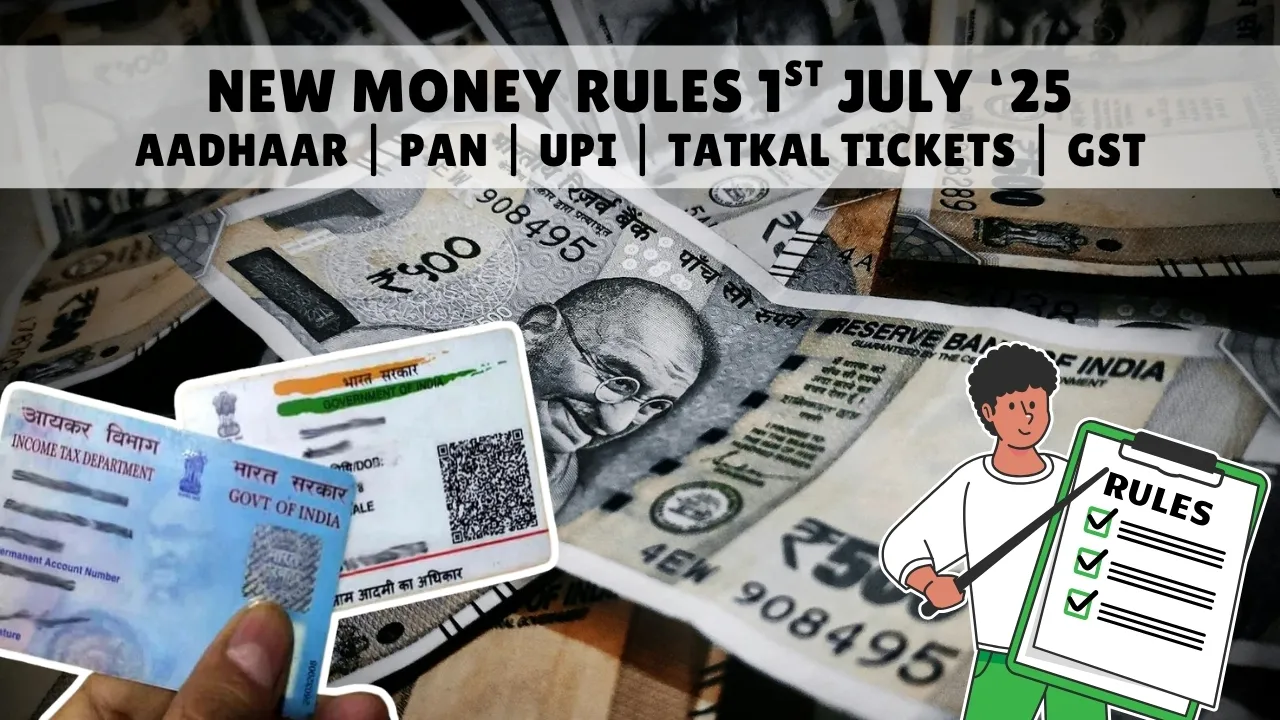Starting July 2025, a wide range of financial activities such as UPI payments, Tatkal train booking, PAN card applications, and GST returns will undergo significant regulatory shifts in India. This guide aims to help our Indian readers understand all the crucial changes.

1. UPI Chargeback Rules: Easier and Faster Refunds
- The National Payments Corporation of India (NPCI) has updated the UPI chargeback process.
- In the past, banks had to seek approval from NPCI in cases where chargebacks—regardless of their validity—were denied.
- As of July 2025, both banks and financial institutions will be allowed to independently handle genuine declines to chargeback requests without having to go through NPCI.
- This means faster and smoother refunds for failed or disputed UPI transactions, improving the digital payments experience for everyone.
2. Aadhaar Now Mandatory for New PAN Cards
- From July 1, 2025, Aadhaar is compulsory for anyone applying for a new PAN card.
- Previously, you could use any valid ID and a birth certificate. Now, Aadhaar verification is a must, as per the Central Board of Direct Taxes (CBDT).
- This move aims to prevent duplicate PAN cards and make tax compliance easier.
3. New Tatkal Train Ticket Booking Rules
- As of July 1st, 2025 customers will need an Aadhaar verification to book any Tatkal train tickets on the IRCTC site or mobile application.
- From July 15, 2025, OTP authentication will also be mandatory for Tatkal bookings, including those made at computerized PRS counters.
- Ticketing Agents have now been restricted from purchasing tatkal tickets in the first half hour after the opening of the window.
- For AC Tatkal tickets: Agents are barred from selling between 10 am and 10:30 am.
- For non-AC Tatkal tickets: Agents are barred from selling between 11 am and 11:30 am.
- These changes will make ticket booking more secure and fair for regular passengers.
4. GST Return Filing: Stricter Deadlines and Non-Editable Forms
- Beginning July 2025 Taxpayers will no longer have the option to edit their monthly GSTR-3B filings after submission.
- Taxpayers will not be able to submit a GST return similarly after three years past its record due date.
- This applies to forms like GSTR-1, GSTR-3B, GSTR-4, GSTR-5, GSTR-5A, GSTR-6, GSTR-7, GSTR-8, and GSTR-9.
- The changes in GST regulations have been made with the intention of minimizing errors and fraud as well as encouraging adherence within a defined timeline.
5. HDFC Bank Credit Card Charges and Rewards Update
- From July 1, 2025, HDFC Bank will introduce new credit card fees and changes to its rewards program:
- A 1% fee is now applicable to monthly spends above ₹10,000, utility bill payments over ₹50,000, online gaming transactions above ₹10,000, rent payments, fuel payments over ₹15,000, and education payments via third-party apps (capped at ₹4,999).
- There will be no reward points accrued for participating in skill-based online gaming tournaments.
- Monthly limit on insurance reward points.
- These changes affect how you earn rewards and the charges you may pay on your HDFC credit card.
Summary Table: Key Money Rule Changes (July 2025)
| Rule Change | What’s New? | Effective From |
|---|---|---|
| UPI Chargeback Process | Banks can process genuine chargebacks directly | July 2025 |
| Aadhaar for PAN Card | Mandatory for new PAN card applications | July 1, 2025 |
| Tatkal Train Ticket Booking | Aadhaar and OTP required; agent booking restrictions | July 1 & 15, 2025 |
| GST Return Filing | GSTR-3B non-editable; 3-year limit for late filing | July 2025 |
| HDFC Credit Card Fees & Rewards | New charges and reward rules for select transactions | July 1, 2025 |
Why these Changes Matter for You
- Faster UPI refunds mean less complicated processes for UPI payment refunds in case of payment failure or disputes.
- Aadhaar-PAN linking helps prevent tax evasion which is considered a crime. It also makes it easier to perform various financial activities.
- Changes on Tatkal Ticket rules ensures safekeeping and fairness during the train booking process, especially to verified passengers.
- GST rule updates motivate businesses and individuals to file taxes accurately, increase accuracy of returns filing, as well as timely submission within the deadlines prescribed by law.
- Changes on credit cards have the possibility of altering your expenditures and reward earning patterns.
Keep track of these new regulations to manage your finances efficiently, avoid last minute shocks, and are best prepared ahead! For news about UPI, Aadhaar, GST, credit cards and Indian finance check reliable platforms frequently.
These changes are set to impact millions of Indians. Make sure you’re ready!

How the New Money Rules will affect Consumers and Small Businesses
For Indian Consumers
- Greater Security and Transparency:
A new set of rules concerning digital payments, the unified payments interface (UPI), and domestic money transfer systems includes adding stronger security protocols like two factor authentication alongside tighter KYC regulations. These changes will bolster the safety of your funds as well as make tracking transactions streamlined. - Faster and Smoother Refunds will create Trust in Digital payments:
As outlined in the new UPI chargeback policies, consumers will be entitled to faster refunds for disputed or failed transactions which will further enhance trust toward digital payment methods. - Simplified Access to Financial Services:
The requirement of an Aadhaar ID for applying for a PAN card as well as booking Tatkal train tickets simplifies processes while also streamlining verification, speeding up service delivery and reducing the risk of fraud. - Tax Benefits for Digital Payments:
For taxpayers and salaried individuals, new income tax policies coupled with digital payment schemes offer avenues that can ease one’s liability. Earning up to ₹12 lakh annually makes one eligible to avail exemptions from taxation and incurring transactions through cashless means lowers applicable rates. - More Control Over Spending:
Due to recent alterations made by HDFC Bank towards their credit card policy opt-in offers alongside changes designed to enhance customer loyalty might not inspire retention amongst customers anymore thus stimulating rise in mindful spending through avoidance of unnecessary fees baited by poor utilization of credit cards.
For Small Businesses and Traders
- Lower Tax Rates for Digital Transactions:
Small businesses that fall under the presumptive taxation scheme are now paying a tax rate of 6% (a decrease from 8%) on turnover earned through digital payment systems and banking channels. This is great news for those businesses whose operations are primarily cashless since it translates to considerable tax savings- up to 30%. - Higher Transaction Limits and Flexibility:
The RBI has improved access for businesses in rural and underserved markets by raising the cash pay-out limit from ₹5,000 to ₹10,000 per transaction. However, there is a cap of ₹25,000 at a monthly level which limits its growth potential. - Stricter Compliance, Less Fraud:
Tighter KYC norms alongside the need for better record maintenance implies there will be smooth operational transparency. Thus, the risk of fraud and tax evasion diminishes. Alongside this lower risk, enhanced credibility might help secure loans and raise capital due to improved financial standing. - GST Filing Discipline:
Businesses now face stricter deadlines alongside non-editable forms post submission enforcing accurate and timely submissions which helps avoid penalties while maintaining compliance. - Adapting to Digital Economy:
The transition towards electronic payments, remote verification systems, and secure banking motivates small scale enterprises to adopt technology. Businesses that go digital benefit more from tax incentives as well as better access to financial services.
Key Takeaways
- Consumers get safer, faster, and more transparent financial services, with opportunities for tax savings and streamlined processes.
- Small businesses benefit from lower taxes for digital transactions, higher transaction limits, and improved access to credit, but must comply with stricter security and tax rules.
Adopting digital payments and staying compliant with the new rules will help both consumers and small businesses thrive in India’s evolving financial landscape.



